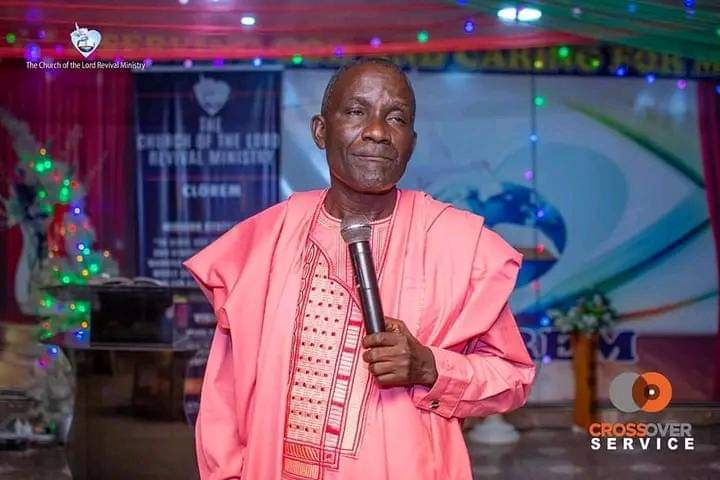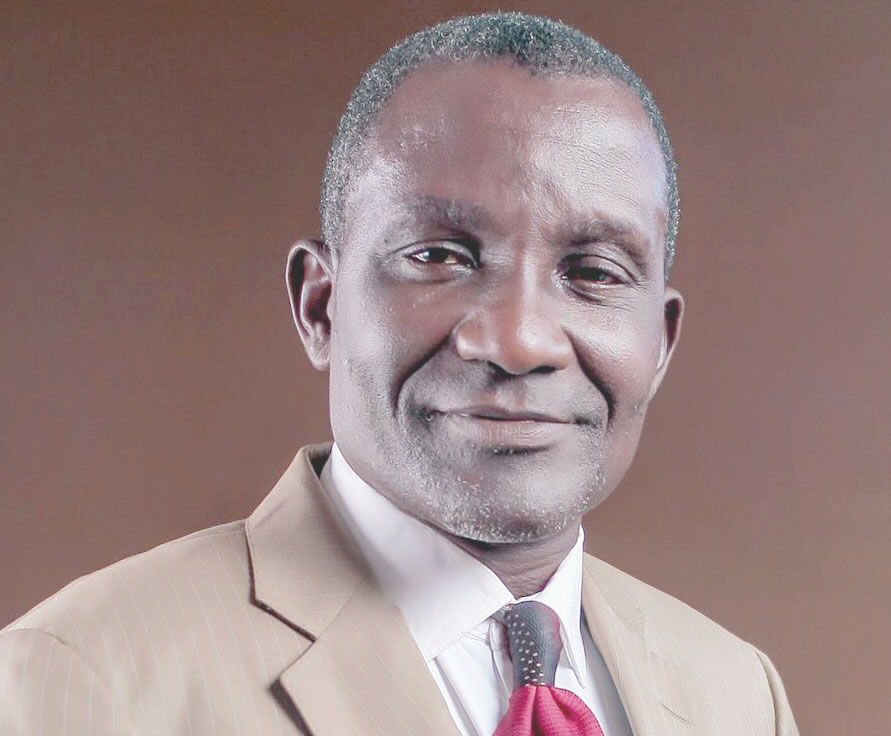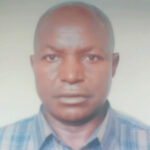Apostle ‘Korede Awolesi is the founder and General Overseer of the Church of the Lord Revival Ministries (CLOREM), Sagamu, Ogun State. In this interview with IFEDAYO OGUNYEMI, he spoke about contemporary issues facing Christendom in Nigeria and the ministry’s impacts in the last 20 years. Excerpts:
There have been reports of persecution of Christians such that the Christian Association of Nigeria (CAN), which you are a member of, has been at the forefront of the campaign against it. What would you say about the issue?
Every knowledgeable Christian should first and foremost thank God for the fulfillment of prophecy. Jesus predicted it a long time ago. It is a sign of the end time. If persecution did not arise, then there would not be persecution of the prophecy. At the same time, we need to be prayerful because nobody knows the plan of God for the human tools used for such persecution. Apostle Paul was once a persecutor of the church before he was saved and became a tool for the growth, development, and propagation of the church. One should always pray that all these things turn out to be in favour of the church.
Would you say that using the instrumentality of government to prosecute these persecutors is out of place?
No, it is not. There is no issue with arresting and bringing persecutors to face the wrath of the law because the government cannot open its eyes and feel nonchalant and unconcerned about it. It undermines the authority of the government. As many of them can be arrested, they should be arrested. Such arrests may be what helps to eliminate or reduce the volume of persecution. I’m not against it. Sometimes, the government is accused of being the one behind the persecution. The government should help to reduce the level of persecution in the country.
In the build-up to the 2023 general election, we saw an unprecedented level of politicking inside the church. Would you subscribe to the notion that politics should be brought to the altar?
There is no way we can separate the church from politics. The issue today is that we are making it more open. God told Samuel he would send someone to him to be anointed as the next king of Israel. When the person came, Samuel anointed him, it was after the anointing that the election of Saul took place. Samuel had already known who the king was before the election. God will not do anything without revealing such things to his people. In October and November 2022, God revealed certain things to me regarding the 2023 elections. I never told anybody except my wife. What I am saying is that the church can be involved but there should be a limit because a lot of our members belong to various political parties. Even if you have someone you have in mind to vote for, let it be yours alone, you can only help them to pray that God’s will be done. God told Samuel to go to the house of Jesse because he had seen somebody who would be the ruler of the people and because he had rejected Saul. He told Ahijah to anoint Jeroboam when he took ten tribes away from Israel.
Another thing that characterised the general elections was the various conflicting prophecies from clerics. What do you attribute to this issue of conflicting prophecies?
We see visions in parts, we hear and know in parts. If I wanted to make a name for myself ahead of the country’s election, I would have publicised my part and would have been among them. But there was no need for me to do that because I didn’t receive any instruction to publicise the revelation. I could not interpret what I saw immediately and couldn’t have made it public. That is the problem with conflicting prophecies. It is one thing to see, it is another thing to be able to interpret it rightly because interpretation belongs to the Lord because he reveals in parts to his people. Jeremiah was asked what he saw, and he said he saw a boiling pot facing the North. If God did not interpret the vision for Jeremiah, he may have mistaken it for another thing entirely. He could have gone to the market to buy a pot and put it on fire, but God told him he was rather bringing calamity from the North. Joseph told Pharaoh that the interpretation of dreams belongs to God just like Daniel told Nebuchadnezzar, but a lot of our people do not have the patience to wait for that interpretation. Nobody is forcing anyone to say anything. The conflict is a result of the differences in what everybody is seeing.
There was an outcry that a party fielded Muslim-Muslim candidates. Now that the said party is in power, how would you advise it to take care of the affairs and welfare of Christians in the country?
On the issue of the Muslim-Muslim ticket, I have said several times that people should not misunderstand the Christian position. What was issued was the official stand of CAN and it does not change the fact that all Christians belong to all existing parties. The official stand of CAN did not mean Christians would not vote for their choice. Would I tell my church member who was once an APC chairman not to vote for his party? It is only an official stand. If God had allowed them to get into the leadership position, our job now is to assist them in prayers. The fear behind that position was that when a Christian was at the helm of affairs, there was persecution, what then would happen if there was no Christian at the top? Nobody knows how God does his things. The issue of persecution of Christians may even be better arrested at a time when there’s no Christian at the top. Irrespective of who is in government, it is the job of the church to pray for them, for the restoration of peace in Nigeria and the manifestation of God’s will.
About 20 years ago, you founded the Church of the Lord Revival Ministries (CLOREM). What is the rationale behind the establishment?
The birth of the ministry was a product of an earlier revelation I first received in 1996 and was repeated in 1999. The third time of confirmation was August 10, 2000, when the name was revealed to me. I heard it audibly and it was written. When it was the appointed time, about six years after the first revelation, I knew that it was time and that was what led to the inauguration of the ministry 20 years ago.
You said you knew it was time, what was the conviction that you had?
I was already aware that it is one thing to receive revelation about a ministry and it is another thing to be able to wait till the maturity of the time –what we call the appointed time. Biblically, if you want to compare it, we will say Samuel heard God speak, he heard the calling of God. At the first hearing, Eli said to him “Go and sleep” meaning that it was not yet time to answer the call. He had the voice for the second time. He knew God was calling. He knew he heard a voice, but Eli knew more about the ministry and told him it was not yet time. At the time, Eli perceived that it was time to learn how to answer. So, I was in Ghana in 2002, coming from a mission when I had the burden heavily on me. We were coming from Guinea and traveling towards Accra early in the morning; I felt it. I knew that what he spoke to me about in 1996 was about to manifest. If one is patient, one will know that the time is now. When he was talking to me in the moving vehicle, it was dark. I placed my hand on a diary and was writing in darkness. It was only at checkpoints that I got illumination. Away from the illumination I got from the checkpoints, I just kept on scribbling in the dark. That compelled me to tell my father in the Lord who confirmed it even before I went to him. On two occasions while handling seminars, he said God told him a gap was going to be created in his ministry. After I approached him about the timeliness of my revelation, he later said I was the gap God was telling him would be created. At that time, I was the administrative secretary of his ministry.

The motto of the church after several years remains “serving God and caring for mankind.” How did that come about?
The first purpose of the ministry is to serve God, to evangelise and bring people to know God and serve him. The second leg was revealed to me on two occasions by God even before the birth of the ministry. In one of them, I was passing by a place near Palmgrove, Lagos in the dead of the night when I saw many people in rags, they were the poor and needy. When they heard that I was coming, many of them lined up with bowls. God made me see myself running a sort of orphanage, caring for people. And that is why we do what we do right from the ministry’s birth. We call that outreach “Mercy Channels: A Humanitarian Scheme of the church.” The objectives are to identify the poor, underprivileged, and physically challenged, who are in need and are truly helpless, and give them necessary but affordable support so that they can have reasons to glorify God. It is for giving relief to various categories of people in need – widows, orphans, blind, prisoners, the hungry, naked, rejected, abandoned, deaf, beggar, wounded, broken-hearted. For instance, we take packages to the school of people with special needs almost every year. For the past few years, I have now become their regular guest speaker during their convention. These are some of the things that formed the basis of the church’s motto.
Twenty years down the line, what has been the impact of CLOREM in the light of “serving God and caring for mankind”?
God has helped CLOREM to promote and enhance the service of God and care for mankind. Despite being the general overseer all these years, I have had the privilege of being the chairman of the Interdenominational Ministers Association (IMA) founded by Prophet Timothy Obadare for the past six years. I am the liaison officer for the Christian Association of Nigeria (CAN) for Ogun East Senatorial District and state secretary for the Christian Pentecostal Fellowship of Nigeria (CPFN). I was once the state secretary of the Pentecostal Fellowship of Nigeria (PFN). I am presently the senior special adviser to the state chairman on administration as well as the national director of training for IMA. Apart from that, we have been able to organise crusades through CLOREM in so many places, invited to speak at seminars and in different churches. I have equally had the privilege of running market fellowships, palace ministry and weekly fellowships in palaces with one in the 16th year while coordinating kings for the annual Oba’s Day in Remoland. The Lord has been so faithful to me in terms of serving God.
In terms of caring for mankind, the story of Noah Onoja readily comes to mind. We went for a crusade in a village when we saw him. His parents are not even members of our church to date. He told us he dropped out of school at the School of the Blind in Ijebu-Igbo and God directed us to re-enroll him and he finished there. The church sent him to secondary school and now he is in a tertiary institution. The church is responsible for his education and housing till date. And that is just one of the many interventions the church is responsible for. There are people we give money to every week because they are unable to make ends meet. We send gifts to the school of the handicapped regularly.
What are the memorable moments in the life of the ministry in the last 20 years?
I feel excited about the achievements of the church in the last 20 years. They are far beyond my expectations. That is why I regard myself as a product of his mercy and proof of his faithfulness. God has been so good to the church beyond Christendom and the state. Two programmes are so dear to me, which God has used as a testament to the impact of the ministry. They are the annual thanksgiving service of the Akarigbo of Remo where I have been the chairman of the organising committee since 2014, The second one is the Oba’s Day in Remoland which started in 2006. God uses me to mobilise all obas in the area while we invite obas who are Christians from outside the state to minister to them every year. These kinds of impacts create joy in me aside from the several other things the church has accomplished for God in the lives of many other families.
READ ALSO FROM NIGERIAN TRIBUNE






